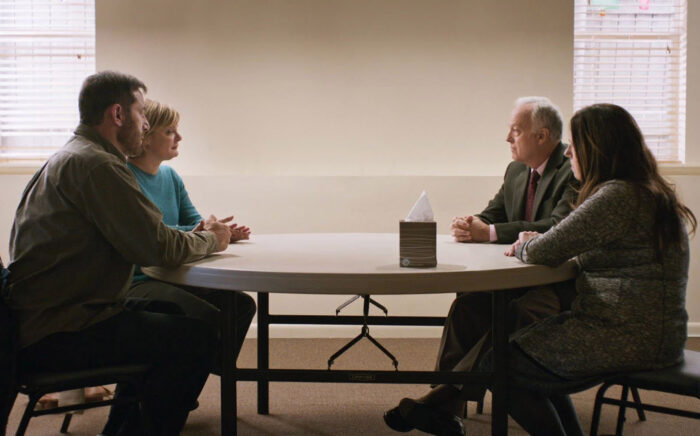VOD film review: Mass (2021)
Review Overview
Sensitive scripting
8Understated direction
8Impeccable performance
8David Farnor | On 23, Jan 2022
Director: Fran Kranz
Cast: Ann Dowd, Jason Isaacs, Martha Plimpton, Reed Birney
Certificate: 12
How do you forgive someone for something unforgivable? How do you forgive their family? And how do you even begin to vocalise doing so, let alone the journey to get to that point? All these weighty questions lies at the heart of Mass, a drama that has the hefty pull and devastating gravitas of a gaping black hole.
The feature debut of writer-director Fran Kranz, the film introduces us to two sets of parents: Jay (Jason Isaacs) and Gail (Martha Plimpton), and Linda (Ann Dowd) and Richard (Reed Birney). They have agreed to meet together for a conversation at a small church, which has the potential to be a healing space for the quartet, but it soon becomes clear that there’s no guarantee of that, as they arrive one by one (Linda and Richard have recently separated), settling into the neutral chairs and drinking from the bottled water timidly laid out at the back.
The subject of their discussion is an event years ago involving their sons, Hayden and Evan, and allowing them to explicitly address it in their own time is all part of the film’s quiet power; it’s as understated as it is character-driven, with Fran Kranz’s script resisting any urge to contrive dramatic suspense. Instead, he simply allows his characters to sit down and talk, and relies on their words to do the talking.
It’s difficult, complex material, and Kranz grapples with it honestly and confidently, using the single location to gently emphasise the intensity of the encounter, while never letting his camera stay fixed to who’s speaking; it glides around the table to pick up the reactions, both verbal and silent, of each participant. It could easily work on the stage, the set-up recalling Yasmina Reza’s play, God of Carnage, which was adapted into the 2011 film Carnage. But it’s theatrical in the best way possible, carrying the raw immediacy of a play right through the close-up lens.
The cast are uniformly exceptional, each one delivering one of the best performances of their career, even when they’re not speaking. Reed Birney’s Richard is terse and logical, but visibly uncomfortable and human beneath that formal facade, while Ann Dowd’s Linda is already crumbled and crumpled before the emotional blows start to land. Martha Plimpton is unflinching as the haunted Gail, even as she’s hurt and withdrawn, while Jason Isaacs is heart-wrenching in his stillness, which gives way to simmering unease and unrest.
Together, they foster a dialogue of reconciliation that tackles daunting themes of guilty, regret, justice and blame, but doesn’t one feel heavy-handed. As the film moves through those waters to something approaching acceptance, understanding and perhaps, one day, absolution, the result is hugely cathartic. An intensely moving chamber piece, impeccably performed.



















